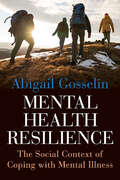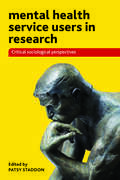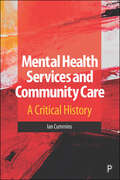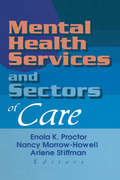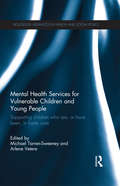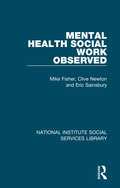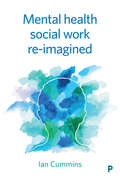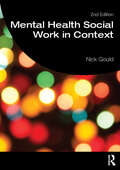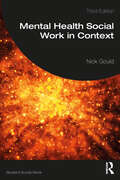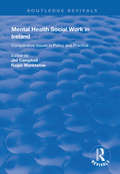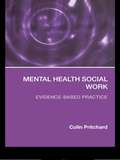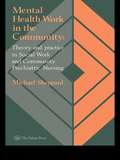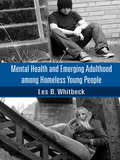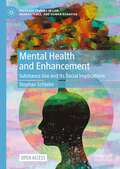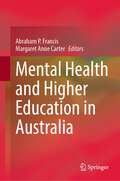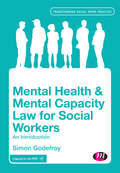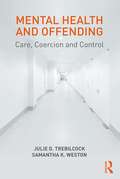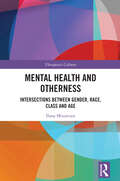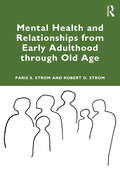- Table View
- List View
Mental Health Resilience: The Social Context of Coping with Mental Illness
by Abigail GosselinWhile resilience is traditionally understood as an inner trait that individuals possess inside themselves, Mental Health Resilience argues that resilience should be seen as the product of social factors, where other individuals and institutions provide the resources, opportunities, and support that enable resilience. Resilience is also partly a matter of justice, as people can only be resilient in addressing their vulnerabilities when they are given adequate resources and opportunities, and in just ways. Seen in this light, Abigail Gosselin examines what a person who has mental illness needs to have the resilience required for mental health recovery and for coping with life challenges in general. With its focus on the social and political conditions of resilience, Mental Health Resilience will appeal to fields such as social philosophy, feminist political philosophy, philosophy of psychiatry, medical humanities, bioethics, and disability studies.
Mental Health Service Users in Research: Critical Sociological Perspectives
by Patsy StaddonThis book aims to show the value but also the difficulties encountered in the application of 'insider knowledge' in service user research. Mental health service users in research considers ways of 'doing research' which bring multiple understandings together effectively, and explains the sociological use of autobiography and its relevance. It examines how our identity shapes the knowledge we produce, and asks why voices which challenge contemporary beliefs about health and the role of treatment are often silenced. An imbalance of power and opportunity for service users, and the stigmatising nature of services, are considered as human rights issues.Most of the contributors to the book are service users/survivors as well as academics. Their fields of expertise include LGB issues, racial tensions, and recovering from the shame and stigma of alcoholism. They stress the importance of research approaches which involve mutualities of respect and understanding within the worlds of researcher, clinician and service user/survivor.
Mental Health Services and Community Care: A Critical History
by Ian CumminsThis critical interdisciplinary study charts the modern history of mental health services, reflects upon the evolution of care in communities and considers the most effective policies and practices for the future. Starting with the development of community care in the 1960s, Cummins explores the political, economic and bureaucratic factors behind the changes and crises in mental health social care since, returning to those roots to identify progressive principles that can pave a sustainable pathway forward. This is a ground-breaking contribution to debates about the role, values and future of community care and is vital reading for students, teachers and researchers in the field of social work and mental health.
Mental Health Services and Sectors of Care
by Enola K. Proctor Nancy Morrow-Howell Arlene StiffmanThrough Mental Health Services and Sectors of Care, physicians, researchers, and educators will find suggestions and guidelines for planning and implementing interagency projects that involve child welfare and juvenile justice agencies to improve the lives of children on the margins of our society. From this book, you will discover how the child welfare system functions as the gateway to the receipt of mental health services for many children. With Mental Health Services and Sectors of Care, you will gain insight into the possible reasons behind gender influenced behaviors and get ideas on how you can keep them from occurring in your classroom or clinical setting. From Mental Health Services and Sectors of Care, you will discover how you can benefit from the experiences of seasoned professionals to make you a more successful social worker. This intelligent book provides you with valuable insights into how you can help meet the challenges of mental health services delivery, including: examining the trend that many youths entering emergency shelter care facilities have had extensive involvement with other service systems exploring the fact that the majority of children and youths in foster care have been identified as needing mental health services understanding how treatment options for physicians treating depression in their patients are shaped by the gender of both the physician and the patient integrating responsiveness into the public children’s service system to address each child’s individual mental health needs Comprehensive and thorough, this important guide will help you understand the essential roles that medical and social services play in the care of those with mental disorders. Mental Health Services and Sectors of Care gives you the information you need to help you give patients adequate and effective care.
Mental Health Services for Vulnerable Children and Young People: Supporting Children who are, or have been, in Foster Care
by Arlene Vetere Michael Tarren-SweeneyMore than half of children either in foster care, or adopted from care in the developed world, have a measurable need for mental health services, while up to one quarter present with complex and severe trauma- and attachment-related psychological disorders. This book outlines how services can effectively detect, prevent, and treat mental health difficulties in this vulnerable population. Responding to increasing evidence that standard child and adolescent mental health services are poorly matched to the mental health service needs of children and young people who have been in foster care, this book provides expert guidance on the design of specialised services. The first part provides an overview of these children’s mental health needs, their use of mental health services and what is known about the effectiveness of mental health interventions provided to them. The second part presents some recent innovations in mental health service delivery, concentrating on advances in clinical and developmental assessment and treatment. The final part confronts the challenges for delivering effective mental health services in this area. This is the definitive international reference for the design of specialised mental health services for children and young people in care and those adopted from care. It is invaluable reading for health and social care professionals working with this population and academics with an interest in child and adolescent mental health from a range of disciplines, including social work, nursing and psychology.
Mental Health Social Work Observed (National Institute Social Services Library)
by Mike Fisher Eric Sainsbury Clive NewtonDespite extensive changes in the organisation of social and psychiatric services, there had been no study of mental health social work in the UK since the early 1960s. There was, however, no shortage of ‘received wisdom’ about the perceived failure of social work to provide a service to the mentally disordered. Originally published in 1984, it was to provide some basic information about the practice of social work in this field that the study was conducted on which Mental Health Social Work Observed is based. The authors looked at both long-term work and emergency work in which the use of compulsory powers was requested. In addition to the views of social workers, the opinions of psychiatrists, family practitioners and of the clients themselves were sought in order to gain a full picture of social work in practice. Through their thorough immersion in the field of study and through their experience of social work and of mental health issues, the authors were able to provide a sympathetic and lucid account of the difficulties of mental health social work and of the thorny issue of interprofessional relationships which will ring true to the practitioner. They produced recommendations relevant to social work practice at the time and this book would be found useful to social workers and their managers, to psychiatrists, family practitioners, psychiatric nurses and clinical psychologists. Of particular relevance to the then current changes in the role of the social worker under the new mental health legislation is the authors’ study of mental health emergency work, culminating in a recommended code of practice.
Mental Health Social Work Reimagined
by Ian CumminsTaking a critical and radical approach, this book calls for a return to mental health social work that has personal relationships and an emotional connection between workers and those experiencing distress at its core. The optimism that underpinned the development of community care policies has dissipated to be replaced by a form of bleak managerialism. Neoliberalism has added stress to services already under great pressure and created a danger that we could revert to institutional forms of care. This much-needed book argues that the original progressive values of community care policies need to be rediscovered, updated and reinvigorated to provide a basis for a mental health social work that returns to fundamental notions of dignity and citizenship.
Mental Health Social Work in Context (Student Social Work)
by Nick GouldThis new edition of Mental Health Social Work in Context continues to be an authoritative, evidence based introduction to an area of specialism chosen by many social work students. Grounded in the social models of mental health particularly relevant to qualifying social workers, but also familiarising students with social aspects of medical perspectives, this core text helps to prepare students for practice and to develop their knowledge around: promoting the social inclusion of people with mental health problems the changing context of multidisciplinary mental health services an integrated evidence base for practice working with people with mental health problems across the life course. In this new edition the author has reflected on the impact of the global recession and austerity policies, both on the mental health of the population but also the much sharper conditions and reduced services within which social workers are now operating. This fully updated 2nd edition is an essential textbook for all social work students taking undergraduate and postgraduate qualifying degrees, and will also be invaluable for practitioners undertaking post-qualifying awards in mental health social work.
Mental Health Social Work in Context (Student Social Work)
by Nick GouldThis new edition of Mental Health Social Work in Context continues to be an authoritative, evidence-based introduction to a core area of the social work curriculum. Grounded in the social models of mental health particularly relevant to qualifying social workers, but also intended to familiarise students with social aspects of medical perspectives, this core text helps to prepare students for practice and to develop their knowledge around: • promoting the social inclusion of people with mental health problems; • the changing context of multidisciplinary mental health services; • an integrated evidence base for practice; and • working with people with mental health problems across the life course. Including new material on proposed reforms to mental health and mental capacity legislation, this book also contains major revisions that focus on the statutory and policy contexts of social work practice as well as ongoing changes in the organisational frameworks for the delivery of services and implications for the social work role. This fully updated third edition is an essential textbook for all social work students taking undergraduate and postgraduate qualifying degrees, and it will also be invaluable for practitioners undertaking post-qualifying awards in mental health social work.
Mental Health Social Work in Ireland: Comparative Issues in Policy and Practice (Routledge Revivals)
by Jim Campbell Roger ManktelowFirst published in 1998, this pioneering text examines how social, political and organisational changes in Ireland have shaped mental health social work practice in the late twentieth century. The co-editors have gathered together a range of contributors who provide knowledge and expertise in a variety of disciplines and practice settings which helps reveal the complex relationship between mental health social work, the citizen and the state in Ireland, North and South. The volume includes chapters on a range of current issues facing mental health social workers and practitioners drawing on various sources in Ireland, Europe and North America. These include psychiatric social work practice, mental health policy, mental health social work and the law, community care policies, addictions work, and work with older people.
Mental Health Social Work: Evidence-Based Practice
by Colin PritchardIn Mental Health Social Work, Colin Pritchard draws on his many years of experience in research, teaching and practice in order to explore key issues for social workers who want to work in the mental health field. Mental health social work can be one of the most rewarding and one of the most frustrating areas of social work practice. Social workers need to have a good knowledge of interventions and their evidence bases, from pharmacology to psychotherapy, but also be able to work sensitively and effectively with both clients and carers in a rapidly changing context. Based on a series of case studies and research based practice, the book explores key topics including: the multiple factors affecting mental health the bio-psycho-social model of practice key areas including depression, suicide, schizophrenia and personality disorder the mental healthâ€"child protection interface residential work treatment modalities. Presenting new and challenging research findings in this field, this book will be invaluable reading for undergraduate social work students and for practising social workers.
Mental Health Work In The Community: Theory And Practice In Social Work And Community Psychiatric Nursing
by Michael SheppardA presentation of a comparative analysis of the work of mental health social workers and community psychiatric nurses, an issue of importance because of "community care" and also important as much of their work territory overlaps. The findings are more favourable to social workers.
Mental Health and Disasters
by Yuval Neria Sandro Galea Fran H. NorrisSince the attacks of September 11, 2001, disaster preparedness and response has developed into a discrete subspecialty in medicine, and the paramount health care initiative of the U. S. Government. The mental health component of disaster response is a serious subject of study, as trauma is associated with a substantial and long-lasting psychologic burden, both on an individual and community level. The psychopathologies associated with disaster are also quite broad, varying from several different types of post-traumatic stress and anxiety disorders to acute variations of grief-associated depression. This book is the definitive reference on mental health and disasters, focused on the assessment and treatment of the full spectrum of psychopathologies associated with many different types of individual disasters. The logistics for utilizing pre-existing community-based mental health services, as well as the development of new programs, are covered in depth. Case studies and perspectives for improving care, incorporating lessons from Hurricane Katrina and 9/11, are included in detail.
Mental Health and Emerging Adulthood among Homeless Young People
by Les B. WhitbeckWhat happens to homeless and runaway adolescents when they become adults? This is the first study that follows homeless youth into young adulthood and reviews the mental health consequences of runaway episodes and street life. The adolescents were interviewed every three months for three years from their mid teens to their early twenties. The study documents the psychological consequences associated with becoming adults when missing the critical developmental tasks of adolescence. The authors report high levels of psychological problems associated with victimization prior to and after running away. These victimization experiences shape the behaviors of these young people, affecting their relationships with others and their chances of conventional adjustment. Across time, the more successful their adaptation to street life and the street economy, the more barriers to conventional adult life emerge. The distress, including self-mutilation and suicidal behaviors, among this population is examined, as well as the impact street life has on future relationships, education, and employment. Nutritional and health problems are also explored, along with the social and economic impact of this population on society. As such, the book provides insight about why the current prevention and treatment programs are failing in an effort to help policy makers modify approaches to adolescent runaways. Intended as a supplementary text for undergraduate and/or graduate courses on homelessness, high risk youth, social deviance, adolescence and/or emerging adulthood taught in departments of psychology, human development, sociology, social work, and public health, this compelling book will also appeal to anyone who works with homeless adolescents.
Mental Health and Enhancement: Substance Use and Its Social Implications (Palgrave Studies in Law, Neuroscience, and Human Behavior)
by Stephan SchleimThis book takes the reader from basic questions like “What is health?” and “What is a psychiatric disorder?”, into the midst of people’s present mental health and enhancement choices. More and more people receive psychiatric diagnoses and the use of psychopharmacological drugs keeps increasing. Concurrently, media report the popularity of “brain doping” or “study drugs” on campuses as well as at the workplace. This open access book tests the hypothesis of whether mental health and enhancement can be seen as two sides of the same coin: that the demands on cognitive and emotional functioning have been increasing and psychoactive substances are used to meet these demands.Whether the increasing number of diagnoses means that really more people are suffering from psychological problems will be discussed just as whether the media accurately describe “brain doping” as a new and rising trend. An individual section describes non-pharmacological alternatives to maintain and increase one’s mental well-being. To answer these and many more questions, the author critically reviews evidence from epidemiology, psychiatry, and psychology.That people with and without psychiatric diagnoses are often using the same substances – for example, the stimulant drugs Adderall or Ritalin – to cope with their problems is presented as evidence to look beyond the traditional distinction between disorder, health, and enhancement. Likewise, different meanings of “drug” in historical and present contexts illustrate that the way we think of mental health and (il)legitimate drug use reflects our own culture. The book’s focus on addiction/substance use disorders makes it also relevant to the ongoing discussion of drug policy.
Mental Health and Higher Education in Australia
by Margaret Anne Carter Abraham P. FrancisThis book addresses a broad range of issues related to mental health in higher education in Australia, with specific reference to student and staff well-being. It examines the challenges of creating and sustaining more resilient cultures within higher education and the community. Showcasing some of Australia's unique experiences, the authors present a multidisciplinary perspective of mental health supports and services relevant to the higher education landscape. This book examines the different ways Australian higher education institutions responded/are responding to the COVID-19 pandemic, with reference to domestic and international students. Through the exploration of practice and research, the authors add to the rich discourses on well-being in the higher education.
Mental Health and Mental Capacity Law for Social Workers: An Introduction (Transforming Social Work Practice Series)
by Mr Simon GodefroyMany social work students find the study of mental health legislation a complex and at times challenging process. Acts of law can seem irrelevant and far-removed from everyday practice and the person-centred approach that many social workers take. This book introduces students to the fundamental principles of mental health law and how they can be applied to everyday practice. There are clear introductions to key Acts such as the Mental Capacity Act and the Mental Health Act as well as the relevant Codes of Practice. These introductions, applied to social work case examples from practice, make this book a perfect key text for the social work law module. Students will see that mental health law doesn't exist in a vacuum and instead develops and evolves through constant interaction with the fundamental principles of sound social work practice.
Mental Health and Mental Capacity Law for Social Workers: An Introduction (Transforming Social Work Practice Series)
by Simon GodefroyMany social work students find the study of mental health legislation a complex and at times challenging process. Acts of law can seem irrelevant and far-removed from everyday practice and the person-centred approach that many social workers take. This book introduces students to the fundamental principles of mental health law and how they can be applied to everyday practice. There are clear introductions to key Acts such as the Mental Capacity Act and the Mental Health Act as well as the relevant Codes of Practice. These introductions, applied to social work case examples from practice, make this book a perfect key text for the social work law module. Students will see that mental health law doesn′t exist in a vacuum and instead develops and evolves through constant interaction with the fundamental principles of sound social work practice.
Mental Health and Offending: Care, Coercion and Control
by Julie D. Trebilcock Samantha K. WestonThis book explores the controversial relationship between mental health and offending and looks at the ways in which offenders with mental health problems are cared for, coerced and controlled by the criminal justice and mental health systems. It provides a much-needed criminological approach to the field of forensic mental health. Beginning with an exploration into why the relationship between mental health and offending is so complex, readers will be introduced to a range of perspectives through which mental health and its relationship to offending behaviour can be understood. The book considers the politics surrounding mental health and offending, focusing particularly on the changing policy response to mentally disordered offenders since the mid-1990s. With dedicated chapters concerning the police, courts, secure services and the community, this book explores a range of issues including: • The tensions between the care, coercion and control of mentally disordered offenders • The increasingly blurred boundaries between mental health and criminal justice • Rights, responsibilities, accountability and blame • Risk, public protection and precaution • Challenges involved with treatment, recovery and rehabilitation • Staffing challenges surrounding multi-agency working • Funding, privatisation and challenges surrounding service commissioning • Methodological challenges in the field. Providing an accessible and concise overview of the field and its key perspectives, this book is essential reading for undergraduate and postgraduate courses in mental health offered by criminology, criminal justice, sociology, social work, nursing and public policy departments. It will also be of interest to a wide range of mental health and criminal justice practitioners.
Mental Health and Otherness: Intersections between Gender, Race, Class and Age (Therapeutic Cultures)
by Ilana MountianBased on two decades of research in Brazil and the UK, this book explores the ways in which intersections of gender, race and class affect the positioning of the subject as 'Other' in discourses of health, and how the positioning of the subject as 'Other' has implications for health research and mental health practice.Drawing on feminist, post-colonial and decolonial studies, psychoanalysis and discourse analysis, Mental Health and Otherness examines the experiences of immigrants, drug users and transsexual people in health and mental health settings, and the ways in which stereotypical understandings can affect the subject.This book is a study of the discursive construction of ideas about health and mental health in the West and the awareness of processes of othering in clinical practice. It will appeal to scholars in psychology, sociology and cultural studies with an interest in mental health, health care and intersectionality.
Mental Health and Palestinian Citizens in Israel (Indiana Series In Middle East Studies)
by Edited by Muhammad M. Haj-Yahia, Ora Nakash, and Itzhak LevavSocial work studies examining the mental health issues faced by Arab-Palestinian service users, their families, and their communities in Israel.Minorities face particular social strains, and these are often manifested in their overall mental health. In Israel, just under a quarter of the citizens are Arab Palestinians, yet very little has been published exploring the spectrum of mental health issues prevalent in this population. The work collected here draws on the first-hand experience of experts working with Israeli Palestinians to highlight the problems faced by service users, their families, and their communities. Palestinians in Israel face unique social, gender, and family-related conditions that also need reliable research and assessment. Mental Health and Palestinian Citizens in Israel offers research and observation on three central topics: socio-cultural determinants of mental health, mental health needs, and mental health service utilization. From suicidal behaviors and addiction to generational trauma and the particular concerns of children and the elderly, this broad and careful collection of research opens new dialogues on treatment, prevention, and methods for providing the best possible care to those in need.
Mental Health and Palestinian Citizens in Israel (Indiana Series in Middle East Studies)
by Itzhak Levav Edited by Muhammad M. Haj-Yahia Ora NakashMinorities face particular social strains, and these are often manifested in their overall mental health. In Israel, just under a quarter of the citizens are Arab Palestinians, yet very little has been published exploring the spectrum of mental health issues prevalent in this population. The work collected here draws on the first-hand experience of experts working with Israeli Palestinians to highlight the problems faced by service users, their families, and their communities. Palestinians in Israel face unique social, gender, and family-related conditions that also need reliable research and assessment. Mental Health and Palestinian Citizens in Israel offers research and observation on three central topics: socio-cultural determinants of mental health, mental health needs, and mental health service utilization. From suicidal behaviors and addiction to generational trauma and the particular concerns of children and the elderly, this broad and careful collection of research opens new dialogues on treatment, prevention, and methods for providing the best possible care to those in need.
Mental Health and Poverty
by Rob Poole Robert Higgo Catherine A. Robinson Rob Poole Robert HiggoThere is strong scientific evidence that poverty is a cause of mental illness. This book brings together a body of knowledge from biomedical and social science literature that is of importance to both academics and practitioners. It explores a broad range of issues, including stigma, the recovery model and substance misuse. The role of childhood adversity is examined, together with other potential causal mechanisms. The content is accessible and engaging, with numerous references pointing readers to the best resources for further information. Poverty is not inevitable, even in a difficult economic climate. The time is ripe for a scientific consensus to inform realistic, hopeful and optimistic campaigns to reduce inequality in the interests of public health and well being. This book provides an evidence-based resource for mental health professionals, social scientists and their students. It will be of interest far beyond those professionally involved in mental health services and research.
Mental Health and Punishments: Critical Perspectives in Theory and Practice
by Paul Taylor Sharon Morley Jason PowellHow might we best manage those who have offended but have mental vulnerabilities? How are risks identified, managed and minimised? What are ideological differences of care and control, punishment and therapy negotiated in practice? These questions are just some which are debated in the eleven chapters of this book. Each with their focus on a given area, authors raise the challenges, controversies, dilemmas and concerns attached to this particular context of delivering justice. Taking insights on imprisonment, community punishments and forensic services, this book provides a broad analysis of environments. But it also casts a critical light on how punishment of the mentally vulnerable sits within public attitudes and ideas, policy discourses, and the ways in which those seen to present as risky and dangerous are imagined. Written in a clear and direct style, this book serves as a valuable resource for those studying, working or researching at the intersections of healthcare and criminal justice domains. This book is essential reading for students and practitioners within the fields of criminology and criminal justice, social work, forensic psychology, forensic psychiatry, mental health nursing and probation.
Mental Health and Relationships from Early Adulthood through Old Age
by Paris S Strom Robert D. StromThis unique text encourages young adults to reflect on their prospective longevity for setting goals and making decisions, become aware of the aspirations and concerns of other generations, and consider personal direction in relation to peer group norms. The sources for learning about mental health and relationships include a blend of academic research, insights from literature, student interviews with older and younger relatives, and personal observations.Stages of adulthood including early adulthood, middle adulthood, retirement age, and old age, are described showing how people can pursue individual growth and nurture the mental health of relatives throughout life. The main themes of younger and middle-aged adults include stress, parenting, peer socialization, family conflict, career readiness, domestic abuse, intergenerational relationships, and mental health. In addition, the educational needs of older adults focus on mental health, family caregiving, grandparenting, physical and social health, problems of younger generations, retirement, loneliness and social isolation, elder abuse, death, grief, and recovery.All chapters conclude with a section about Generational Perspectives Activities, assignments with agenda for class and family discussions, problem-solving scenarios, key concepts, and criteria for self-evaluation. This will be of interest to undergraduate and graduate college students enrolled in lifespan courses offered by family studies, educational psychology, human development, counselling, social work, gerontology, nursing, and business.
